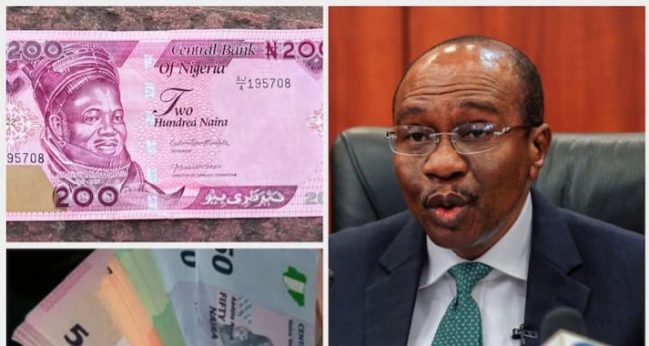

Fresh facts have emerged on why the Central Bank of Nigeria (CBN) on Tuesday announced that it had placed a N20,000 daily withdrawal limit on individual accounts and N50,000 limit on over-the-counter third-party cheques.
Investigation revealed that although the apex bank had been perfecting plans to greatly restrict the use of cash in the Nigerian economy, it swiftly introduced the directive yesterday to foil a move by certain individuals to withdraw a whopping N45 billion from the nation’s banking system.
The certain individuals, who are based in Bayelsa State, were making frantic efforts to withdraw the said sum of money and were shopping for highly placed bank officials at the level of bank managing director to help them with the money laundering effort.
Read Also: N1.4b Fraud: Court Dismisses Kogi Assembly Candidate Bail Application
They were, however, outsmarted by the Godwin Emefiele-led CBN management team, which quickly announced the policy yesterday, thereby forestalling any act of money laundering which could jeopardise the nation’s economy.
CBN governor, Godwin Emefiele had prior to announcing the redesigning of the naira mentioned plans to ensure that the Nigerian economy goes 100 percent cashless. In canvassing for the redesigning of the N200, N500 and N1,000 notes, he had also mentioned that more of the lower notes will be in circulation while the higher denomination notes will be used mostly as a store of value.
True to this, the apex bank in a circular dated December 6, 2022 and signed by the CBN Director, Banking Supervision, Haruna Mustafa, stated that effective January 9, 2023, only N200 notes and below will be loaded by banks into the Automated Teller Machines.
According to the circular, which was issued to all deposit money banks, payment service banks, microfinance banks and primary mortgage banks in the country, individual and corporate organisations’ withdrawal limits are not to exceed N100,000 and N500,000 per week.
Withdrawals above these limits, the circular stated, will attract processing fees of five per cent for individuals and 10 per cent for corporate organisations.
“Third party cheques above N50,000 shall not be eligible for payment over the counter, while extant limits of N10,000,000 on clearing cheques still subsist.”
The circular also stated that the maximum cash withdrawal per week via Automated Teller Machine (ATM) shall be N100,000 subject to a maximum of N20,000 cash withdrawal per day as only denominations of N200 and below shall be loaded into the ATMs. Likewise, the maximum cash withdrawal via point of sale (PoS) terminal was fixed at N20,000 daily.
“In compelling circumstances, not exceeding once a month, where cash withdrawals above the prescribed limits is required for legitimate purposes, such cash withdrawals shall not exceed N5 million and N10 million for individuals and corporate organisations, respectively, and shall be subject to the referenced processing fees in (1) above, in addition to enhanced due diligence and further information requirements.”
To be eligible for the special withdrawals above the stipulated limit, the CBN said individuals and corporate organisations will have to upload, on a CBN portal created for the purpose, valid means of identification of the payee such as National ID, International Passport, Driver’s License, and Bank Verification Number (BVN) of the payee.
Also, to be made available to the CBN will be the notarised customer declaration of the purpose for the cash withdrawal, senior management approval for the withdrawal by the managing director of the drawee, where applicable, and approval in writing by the MD/CEO of the bank authorising the withdrawal.
The CBN also directed that banks’ “monthly returns on cash withdrawal transactions above the specified limits should be rendered to the Banking Supervision Department.”
Banks are also to ensure customer due diligence and suspicious transaction reporting in all circumstances, while customers should be encouraged to use alternative channels (internet banking, mobile banking apps, USSD, cards/POS, eNaira, etc.) to conduct their banking transactions,”
Aiding and abetting the circumvention of this policy will attract severe sanctions, it said.
Commenting on the policy, Professor of Economics at University of Benin, Hassan Ebhozele Oaikhenan said the new CBN policy on money control is a welcome development if the apex bank is able to have a firm control on the quantity of higher denominations in circulation. For him, the new policy will have a beneficial spillover effect on the economy by helping to manage interest rates, limit the capacity of politicians to buy votes and help control inflation.
“It’s a welcome development. Like it is done in Europe, I expect the CBN to make the higher denominations very scarce as a way of putting a tight control on the quantity of money in circulation.
“If the CBN cannot do this, then, the entire policy will be defeated,” he stated.
On the coming elections, the university lecturer said the new policy will limit the capacity of the politicians to conduct the nefarious transaction of vote buying.
“It will definitely have a spillover effect on the political space, to a large extent make our elections free.”
He said allowing the naira to be available has long made it possible for round tripping as anybody can spend the naira to buy the dollar at whatever rate.
“That explains the phenomenal depreciation over the years,” he said, even as he expressed hope that the CBN would be “disciplined enough to put a tight control on money supply which will go a long way in helping to improve the fortunes of the local currency.”
Policy will impact informal sector negatively
To the founder and chief executive of Centre for Promotion of Private Enterprise, an economist, and former director general of the Lagos Chamber of Commerce and Industry (LCCI), Dr Muda Yusuf, the policy will negatively impact the informal sector of the economy.
“The informal sector is a significant part of the economy accounting for over 80 per cent of trade and commerce in the Nigerian economy and substantial components of jobs in the economy. Many of them are in very remote locations where there are no bank branches and they transact business largely in cash.
The distributive trade accounted for N23.3 trillion of the country’s GDP in 2021. This was about 15 per cent of GDP. This restrictive policy will pose a major risk to this very critical sector of the economy.
“There is also the risk that this policy would negate the financial inclusion objective of the CBN. Some of the informal sector operators may avoid the banking system entirely. The CBN needs to think through this policy properly to avoid creating more problems than it sets out to solve.”
On his part, Tope Fasua, an economist, said, “There will be some initial hiccups with businesses such as instances where POS machines do not work and the normal hiccups of trying to process transactions online, downtime, internet issues and all of that.
“Overall there is something that they are aiming at – which is reducing cash transactions in the country and getting more people to process transactions via electronic channels. It is a way of actually getting a better handle of monetary policy management in the country and perhaps, more importantly, reducing corruption.
“When there is too much funds in the society, that means corruption is alive and thriving. I think it is something they ought to have done a while ago, but they are doing it now. There is never a good time to do some of these things because people will complain. The idea is that you pilot some of these programme and then be ready to make amendments and changes as time goes on to reflect the reality on ground.”
Fasua noted that the policy will also be a good step in strengthening the value of the naira as he said “there has been a lot of frenetic transactions heading nowhere and, of course, the cash in circulation, the splurge of funds, also targets the dollars because people want dollars to hold.
“At this rate if this is played right and it is sustained, we may see a scenario where the naira/dollar rate comes down and the naira can strengthen a little bit against the dollar when there is not much money flowing after the dollar.”
On his part, head of financial institutions ratings at Agusto&Co, Ayokunle Olubunmi, noted that whilst the policy is a good one that will help the economy in the long run, it may create a dislocation in the country’s economy in the short run as people strive to adjust to the new policy. To him, the policy will enable the CBN track the flow of funds against what has been happening in the country where its monetary policies do not have control over cash in circulation.
He also noted that the policy in the long run will be good for the credit system as banks will be able to give out loans based on BVN. Asides this, he said it will boost government revenue as small and micro businesses in the informal sector will now be brought into the formal system, thus allowing the tax authorities to be able track and tax them accordingly.
For banks, he said it will be a positive for them as they will be able to further cut down on cost of operation.
“We are more likely to see more banks close branches. Already the number of people working in the banking halls are reducing and with this policy we should see a further reduction and the closure of some branches as most transactions will now be done online.
“However, banks will have to work more on securing their platforms and making them safe against fraud and security breaches.”
For businesses, he said many will turn to banks to use POS as “the banks have a lot of POS that they want to give out to people to use. So, for businesses they will have to use more of that. It may be challenging initially for cash-based businesses but in the long run they will adapt to it.”
Olubunmi noted that another business that would be adversely affected is the POS business as the new policy stipulates a maximum daily withdrawal of N20,000.
“I expect that they will find a way of circumventing the policy.”
On the impact on businesses, Fasua had noted that there would not be much as “there is no cause for worry. There are enough banks looking for where to keep their POS machines to make money, so most businesses will have more than one POS to operate with.”
Ahead of the elections, Olubunmi said vote buying will become more expensive and those who attempt it will either risk leaving a trail when they do transfers or be innovative and find other means of buying votes.
Fasua on his part noted that the policy should limit vote buying although he said “politicians interested in doing that will devise new ways of making payment. Of course, what they are saying now is that you can’t even withdraw more than N500,000 a week from your corporate account. So, for elections we are not supposed to be encouraging payments of cash to voters, so anything that can limit that also limits corruption and so should be supported. I think it is a good one from the central bank.”





















